Community Sector Disaster Capability Project
Welcome to the Community Sector Disaster Capability page. To learn more about the Project, click on the links below:
About the Community Sector Disaster Capability Project
Local Host Services & Partners
About the Community Sector Disaster Capability Project
The Community Sector Disaster Capability Project, led by NCOSS in collaboration with the Local Community Services Association, AbSec and place-based organisations in four NSW locations, showcased the role that non-government social service organisations can play in disaster preparedness and planning.
Commencing in February 2023, the Community Sector Disaster Capability Project aimed to promote and facilitate the role of place-based social service NGOs in supporting communities to reduce disaster risk.
The Project undertook engagement and capacity building activities to promote a collaborative, networked approach to local disaster management, providing an opportunity for place-based social service NGOs, and the communities they support, to bring their expert knowledge and connections to emergency preparedness. The Project gathered data, evidence and community sector perspectives to identify local disaster vulnerabilities, risks and strengths.
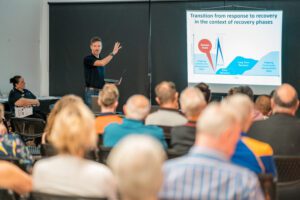 Hawkesbury Community Sector Disaster Capability Team "Dismiss the Myths" NGO& Emergency Management session (Peppercorn Services) | 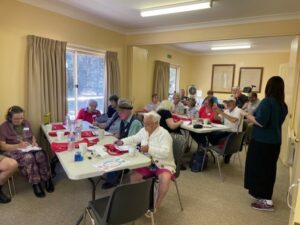 Snowy Monaro Community Sector Disaster Capability Team Team Community Preparedness session with Australian Red Cross |
Local Host Services & Partners
The local Project Host services for the Community Sector Disaster Capability (CSDC) Project provided essential place-based perspectives and knowledge. All the local Project Hosts worked in partnership with other place-based social service NGOs.
- In the Hawkesbury, Peppercorn Services is a well-known and respected community service provider, operating for the last 22 years. Along with other local NGOs, Peppercorn has been active in the ongoing recovery after the floods of recent years. Peppercorn Services partnered with Bligh Park Community Centre to deliver the Project.
- In the NSW Northern Rivers, Resilient Lismore has been at the forefront of coordinating community-led disaster recovery since 2017. They have worked closely with local communities who have been impacted by the 2022 disaster, as well as the wide range of organisations actively working in disaster recovery in the region.
Resilient Lismore partnered with Rekindling the Spirit and the Kyogle Together Incorporated, Mid-Richmond Neighbourhood Centre Incorporated and Nimbin Neighbourhood & Information Centre Incorporated to deliver the Project in Northern Rivers.
- In Snowy Monaro, Monaro Family Support Service (MFSS) has been delivering early intervention and intensive support to individuals and families who may be vulnerable or experiencing adversity for almost 50 years. MFSS has been working with communities and other local NGOs to increase disaster resilience after the Black Summer Bushfires.
- In the Eurobodalla and Bega regions Katungul Aboriginal Corporation Regional Health and Community Services provides wraparound care, advocacy and access to support services. Katungul was integral in providing rapid emergency support during COVID lockdowns and have supported the Black Summer Bushfires recovery. Katungul ACRH&CS partnered with Eden Community Access Centre to deliver the Project.
A range of strategies were implemented locally and strategically to build disaster readiness among vulnerable groups and place-based social service NGOs, and strengthen connections between NGOs and formal disaster management agencies.
CSDC Project objectives included:
- Increasing awareness of the nature and extent of disadvantage and vulnerability in the community, and the role of place-based social service NGOs in reducing disaster risk for relevant population groups and locations.
- Equipping place-based social service NGOs with tools, resources, training and access to expertise to support vulnerable population groups to reduce risk.
- Building ongoing relationships between the social services sector and government/non-government disaster management agencies, to further understanding and inclusion of the strengths and needs of vulnerable population groups in relevant processes from the outset, in particular risk reduction.
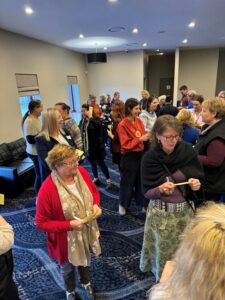 | 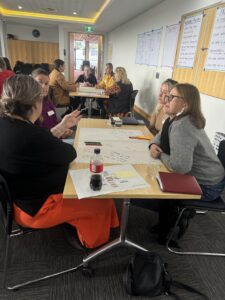 | 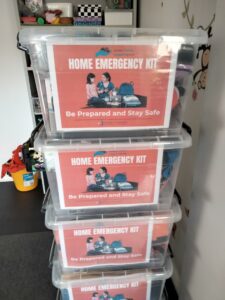 |
| 'Disasters Are Our Business' Workshop, Cooma | Community Preparedness Workshop, Bega | Emergency kits, Snowy Monaro |
Project Guiding Principles
- Meaningful, ongoing disaster risk reduction outcomes require coordinated and collaborative effort between the community, non-government and government initiatives.
- Centring community voice and strengths is integral to effective disaster risk reduction.
- Place-based social service NGOs provide an integral linking role between communities - especially vulnerable populations - and government and non-local services. This is a critical tool for community disaster risk reduction.
- The capabilities of place-based social service NGOs should be reinforced wherever possible.
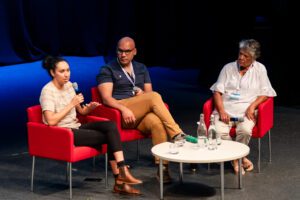 | 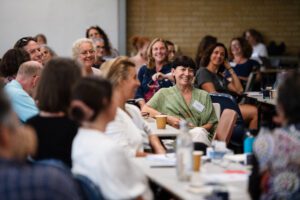 |
| Panel at the Disaster Ready Together Summit, Lismore | Workshop at the Disaster Ready Together Summit, Lismore |
Project Findings & Resources
In each location, the Community Sector Disaster Capability Project has assessed local hazards, socioeconomic vulnerabilities, community assets, considered lesson learned from previous disasters and developed resources for the project in their region:
| Hawkesbury Northern Rivers
Snowy Monaro
Eurobodalla & Bega | 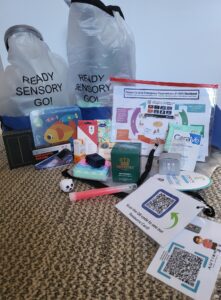 Preparedness event 'go bag', Hawkesbury |
CSDC Project Evaluation
Insight Consulting evaluated the Community Sector Disaster Capability Project:
FINAL CSDC Project Eval Report - Insight - 20240627
- CSDC Evaluation Summary - Bega-Euro
- CSDC Evaluation Summary - Hawkesbury
- CSDC Evaluation Summary - Northern Rivers
- CSDC Evaluation Summary - Snowy Monaro
Strategic Advocacy & Research
NCOSS has made a number of submissions and research reports highlighting the important role of place-based social service NGOs in the response to climate and health hazards, particularly in supporting groups and communities experiencing disadvantage or vulnerability.
It is important to recognise that most social service organisations do not receive funding for disaster management related activities and services. Where funding is available, is it usually through short term grants. This is currently a significant constraint impacting organisations’ capacity to contribute consistently across the disaster cycle.
Report: Community Sector Involvement in Disaster Management
The report Community Sector Involvement in Disaster Management has been published by Southern Cross University, highlighting the critical role NGO services played in the Northern Rivers floods and the need for greater community sector involvement in disaster preparedness and planning.
The research was undertaken in collaboration with NCOSS and place-based services active in the Northern Rivers flood response and recovery.
The Report is available free to download and share through Creative Commons. Donnarumma, S., Doyle, K., & Russ, E. (2023). Community sector involvement in disaster management. Lismore, Southern Cross University. https://doi.org/10.25918/report.315
NCOSS research and submissions:
- NCOSS Submission to the Review of the NSW Reconstruction Authority Act
- NCOSS Submission to Independent Review of Commonwealth Disaster Funding
- The Other Frontline: The essential role of place-based NGOs during the Delta and Omicron COVID-19 outbreaks in NSW
- Aftershock: Addressing the Economic and Social Costs of the Pandemic and Natural Disasters – Report Series
- NCOSS & Muslim Women Australia Submission: Improving crisis communications to culturally and linguistically diverse communities
- Submission to the Independent review of Australia’s COVID-19 response
- The High Cost of Doing Business - administrative and management overload in smaller NGOs
- Submission: NSW Independent Flood Inquiry
How to advocate for your role in disaster adaptation
- Advocacy Toolkit, NCOSS Advocacy Toolkit
- Ask how your peak organisation can support your advocacy
The NCOSS Disaster Support webpages are part of the Community Sector Disaster Capability Project. The Project, a partnership between NCOSS, AbSec and the Local Community Services Association (LCSA), was jointly funded by the Australian and NSW Governments under the National Partnership Agreement on Disaster Risk Reduction, through a Disaster Risk Reduction Fund grant. The CSDC Project was completed in June 2024.
 | 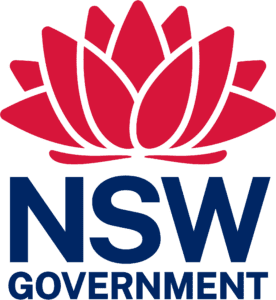 |  | 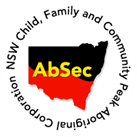 |
